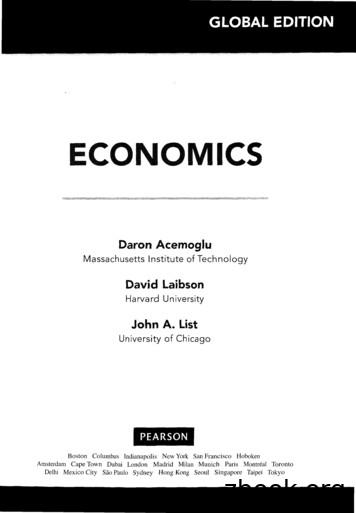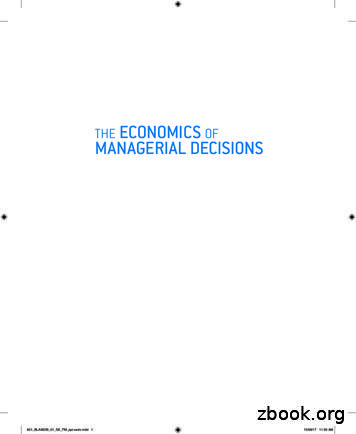Online Ma In Economics
ONLINE MA INECONOMICS
AMERICAN UNIVERSITYONLINE MASTER’SIN ECONOMICSBased in Washington D.C., the epicenter of economic policy, American University’sonline MA in Economics with a specialization in applied economics provides apolicy-oriented curriculum with hands-on guidance from a prestigious facultyof noted experts. Influenced by its location in the nation’s capital, this programconnects you with the people and organizations transforming the global economy.2
EARN YOUR MASTER’S IN JUST 20 MONTHSAmerican University’s online Master of Arts in Economics with aspecialization in applied economics provides you with the real-world skillsto critically analyze the economy and effectively communicate your findingsto a wide audience.The faculty of distinguished economics scholars combine theory andpractice show you how to create solutions to actual economic issues,positioning you for leadership roles. You will learn to:Solve complex mathematical economic modelsCommunicate the reasoning behind construction of those modelsInterpret and explain the meaning of solutionsUtilize models to predict changes in various economic indicatorsDevelop clear and specific research questions and hypothesesEmploy the appropriate data and statistical tools to testyour hypothesesFUNDINGStudents may qualify for federal financial aid. To beconsidered for federal loans and federal work-study, submitthe free application for Federal Student Aid (FAFSA)at fafsa.ed.gov.WHY CHOOSE AMERICAN UNIVERSITY’SMASTER OF ARTS IN ECONOMICS?96 percent of AU’s Master’s in Economics graduates are working, ingrad school or both.Finish your degree in just 20 months.The Princeton Review ranks American No. 4 for Most PoliticallyActive Students and Best Northeastern College.programs.online.american.edu 855.725.76143
FOCUS ON APPLIED ECONOMICSThe online MA in Economics with a specialization in applied economics balances foundational economic theory with quantitative and analytical application. Youwill participate in on-screen problem demonstrations, interactive media and case studies modeled on actual economic issues and current events.The online program consists of 10 courses (30 credits), each eight weeks long, and concludes with a capstone course allowing you to implement everythingyou’ve learned. You will have the option to take up to 6 credit hours of economics coursework on campus or complete the entire program online.COURSESECON 605: Introduction to Mathematical EconomicsThis course begins with a review of logarithms and differential calculus andmoves on to more complex mathematical concepts.ECON 632 (elective): Finance, Stability and GrowthThis course defines the ways in which the banking and financial systemscontribute to the growth and stability or instability of the economy.ECON 600: Microeconomic TheoryThis course covers the foundations of microeconomic theory, focusing on thebehavior of individuals, firms, and the interaction of both in the marketplace.ECON 641 (elective): Public EconomicsThis economics course is an introduction to the concepts of marketequilibrium and efficiency, departures from the efficiency of the market,political economy of voting and rent seeking.ECON 601: Macroeconomic TheoryThis course explores theories of income determination, inflation andunemployment, business cycles and long-run growth. It also covers analysis ofmonetary and fiscal policy, debt dynamics and financial crisis.ECON 623: Applied Econometrics IEconometrics is the application of statistical and mathematical theories toeconomics for the purpose of testing hypotheses and forecasting future trends.This course introduces the concepts and skills to accomplish this along withthe use of the statistical software, Stata.ECON 624: Applied Econometrics IIThis course advances the topic of econometrics, including time-series techniques,limited dependent variables models, and sample selection and censoring.ECON 661 (elective): Survey of Economic DevelopmentThis course covers the evolution of economics since the mid-20th century.It examines important topics in economic development and illustrates theapplication of economic techniques to development issues.ECON 673 (elective): Labor EconomicsExamine contemporary theories of wages, employment, and prices as wellas collective bargaining. Then explore the effect of collective bargaining onwages in the American economy through theories and empirical studies ofwage differentials.ECON 680: Economics MA Capstone SeminarThe Capstone project provides an opportunity to apply the knowledge andskills you have developed in a real-world scenario. In this course you willcomplete a project addressing a major economic issue under close consultationwith a faculty advisor.programs.online.american.edu 855.725.76144
CAREER OUTLOOK FOR ECONOMISTSIn an era of Big Data, organizations across many industries require professionalswith skills in economic analysis and quantitative methods to understand andforecast performance. In the past, a bachelor’s degree was often sufficient. Butaccording to the National Association of Business Economists (NABE) 2012Survey, employers are increasingly require a master’s degree for entry-leveleconomics jobs and advanced economist roles alike.THE NUMBERS ADD UPNearly all (96 percent) of American University’s alumni with an MA inEconomics are actively working, pursuing an advanced degree or doing bothat the same time. Their employers include:U.S. Department of JusticeAARPDeloitteFederal ReserveJP Morgan ChaseOffice of the Comptroller of the CurrencyU.S. Bureau of Labor StatisticsThe Corporate Executive Boardprograms.online.american.edu 855.725.76145
FACULTYColleen Callahan, Associate Professor focuseson U.S. monetary history in the 19th and early 20thcenturies. She received the 2010 Jonathan HughesPrize for Excellence in Teaching Economic Historyfrom the Economic History Association.Amin Mohseni-Cheraghlou, Assistant Professor,has been featured in international journals, and is coauthor of a 2010 book titled The Militarization of thePersian Gulf: An Economic Analysis.Bernhard Gunter, Associate Professor, is aninternational scholar in development economics.His areas of expertise include developmentmacroeconomics, debt sustainability analysis and thesocial impact of globalization. His current researchfocuses on development issues of Bangladesh, andhis work has been published in several pre-eminentinternational journals, including World Development,Development Policy Review and Third World Quarterly.Mary Eschelbach Hansen, Associate Professor,is widely published in the fields of child welfarepolicy and economic history. The National ScienceFoundation, the National Institutes of Health, theAlfred P. Sloan Foundation, and the Institute havefunded her research for New Economic Thinking. Herresearch has contributed to passage of laws such asthe Preventing Sex Trafficking and StrengtheningFamilies Act.Walter G. Park, Professor, has a Ph.D. inEconomics from Yale. He has published severalarticles in acclaimed journals and is an AdvisoryEditor for Research Policy at Elsevier Science.Kara Reynolds, Associate Professor and MA inEconomics Program Director, recently completeda paper with Chad P. Bown, titled “Trade Flowsand Trade Disputes,” in the Review of InternationalOrganizations, June 2015. Her research interestsinclude the political economy of trade protection,particularly anti-dumping protection, and the impactof trade liberalization on workers and firms.Ralph Sonenshine, Assistant Professor, focuseson antitrust, mergers and acquisitions, internationaltrade and finance as well as economic history.Mahmud Yesuf, Assistant Professor, has workedon projects with the World Bank and InternationalFood Policy Research Institute in Africa. His researchinterests include poverty, the environment anddevelopment issues in low-income countries with aspecial focus on behavioral issues within households.Evan Kraft, Economist in Residence, specializesin the economics of transition, monetary policy andbanking issues. His professional experience includesserving as Director of the Research Departmentand Adviser to the Governor of the CroatianNational Bank.programs.online.american.edu 855.725.76146
To learn more about American University’s online MAin Economics, Applied Economics Specialization, call855.725.7614 to speak with an admissions representativeor visit programs.online.american.edu.ONLINE MA INECONOMICS7
ECON 623: Applied Econometrics I Econometrics is the application of statistical and mathematical theories to economics for the purpose of testing hypotheses and forecasting future trends. This course introduces the concepts and skills to accomplish this along with the use of the statistical software, Stata. ECON 624: Applied Econometrics II
Std. 12th Economics Smart Notes, Commerce and Arts (MH Board) Author: Target Publications Subject: Economics Keywords: economics notes class 12, 12th commerce, 12th economics book , 12th commerce books, class 12 economics book, maharashtra state board books for 12th, smart notes, 12th std economics book , 12th economics book maharashtra board, 12th economics guide , maharashtra hsc board .
International Finance 14. Development Policy 15. Institutional Economics 16. Financial Markets 17. Managerial Economics. 13 18. Political Economy 19. Industrial Economics 20. Transport Economics 21. Health Economics 22. Experimental and Behavioral Economics 23. Urban Economics 24. Regional Economics 25. Poverty and Income Distribution
ECONOMICS 40 Chapter 1: The Principles and Practica of Economics 40 1.1 The Scope of Economics 41 Economic Agents and Economic Resources 41 Definition of Economics 42 Positive Economics and Normative Economics 43 Microeconomics and Macroeconomics 44 1.2 Three Principles of Economics
Behavioral Economics Experimental Economics Macroeconomics and Public Sector Economics Monetary Policy Fiscal Policy Cost-Benefit Analysis Economics of Regulations and Competitive Economy Labour and Population Labour Economics Population Economics Human Resource Development Islamic Economics Islamic Banking: Theory and Practice
excess returns over the risk-free rate of each portfolio, and the excess returns of the long- . Journal of Financial Economics, Journal of Financial Markets Journal of Financial Economics. Journal of Financial Economics. Journal of Financial Economics Journal of Financial Economics Journal of Financial Economics Journal of Financial Economics .
1. Essentials of Business Economics- D N Dwivedi, Vikas Publications. 2. Managerial Economics - Dom inick Sal watore . 3. Managerial Economics - Gupta and Mote 4. Economics - Samuel son & N or dhaus 5. Managerial Economics by Peterson and Lewis 6. Micro Economics – Dominick Salvatore 7. Macro Economics –
Labor Economics, Public Economics, Applied Econometrics, and Economics of Education Tia Hilmer, Professor O ce: NH-317, Email: chilmer@sdsu.edu Econometrics, Natural Resources, Environmental Economics . Mathematical Economics (3) Prerequisite: Mathematics 124 or 150. Recommended: Economics 320 or 321. .
Managerial Economics Klein Mathematical Methods for Economics Krugman/Obstfeld/Melitz International Economics: Theory & Policy* Laidler The Demand for Money Lynn Economic Development: Theory and Practice for a Divided World Miller Economics Today* Miller/Benjamin The Economics of Macro Issues Miller/Benjamin/North The Economics of Public Issues .























